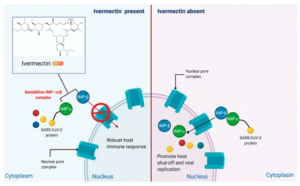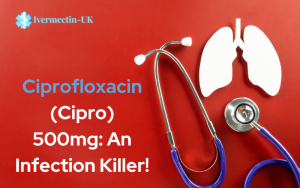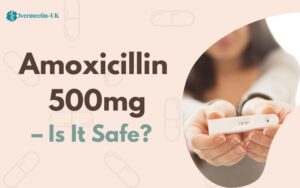Why is Ivermectin being suppressed as a cure for Covid?
Introduction
Covid-19, or Coronavirus disease, is an infectious disease caused by the Sars-cov2 virus that is, since its inception, taken a significant toll on people’s health, incomes, and lives. With the total death count having crossed 3 million, the WHO has characterized it as a pandemic and declared it a Public Health Emergency of National Concern. Currently, there are two variants of the virus, namely Omicron and Delta, out of which Omicron is the slightly less dangerous variant with 53% less risk of hospitalization, 74% less risk of ICU admission, and 91% less risk of death.
Among the numerous treatment options for the virus, Ivermectin has always been in the news for good and bad reasons. Some studies have identified Ivermectin as an adequate prophylactic measure and declared that the odds of contracting the infection had been markedly decreased in people who have used its two doses as a prophylactic. Other studies have demonstrated its ineffectiveness in non-serious cases of Covid.
But before proceeding further, it is important to understand Ivermectin and its efficacy in conditions other than Covid.
A word about Ivermectin
Ivermectin is an award-winning anti-parasitic medication belonging to the class of anthelmintics( drugs used to destroy parasitic worms). While initially developed for the treatment of parasitic infections in domestic animals, it was, in due course, modified and approved for human use. Ivermectin is FDA-approved for treating parasitic infections like Strongyloidiasis and Lymphatic filariasis and is on the WHO list of Essential medications for its

In the initial stages of Covid, when the search for treatment options was still ongoing, Ivermectin was regarded as a possible treatment option because of its successful in-vitro effects on the growth and development of the virus.
Clinical studies showed that a single dose of Ivermectin could limit the virus’s replication within 48 hours of administration through inhibition of IMPαβ1-mediated nuclear import of viral proteins. The study further showed that the levels of viral RNA released from the infected cells were reduced by more than 90-99% with the medication. The treatment of the sars-covid-2 infected cells with Ivermectin for 48 hours resulted in a dramatic reduction of viral RNA of almost 5000 folds compared to the control group.
The Catch
The study failed to demonstrate the dose of Ivermectin required to kill the virus or the potential drug efficacy observed at high Ivermectin concentrations. According to later studies, almost 2190 ng/ml of Ivermectin was required to eliminate Covid effectively. This dose was at least 50 times higher than the maximum concentration achievable with a standard dose of 200 micrograms/kg of the drug.
Even if the drug managed to destroy the virus in-vitro, clinically, such a dose was impractical. If ingested, the result would be overdose and toxicity symptoms surpassing the damage caused by the virus.
New studies that were conducted further failed in demonstrating the effectiveness of the medication for fighting symptoms of Covid. In a study conducted on 817 outpatients with mild or moderate covid, ivermectin use for three days at a dose of 400 μg/kg did not show significant improvement in covid symptoms compared to placebo. There was no therapeutic benefit in secondary clinical outcomes like hospitalization, acute care visits, or deaths. These results did not support ivermectin use in COVID-19 patients with mild or moderate disease.
Why is Ivermectin being suppressed as a cure for covid?
Out of the numerous trials conducted to evaluate the role of Ivermectin in covid patients, the inconsistency of results has been the main culprit. Out of 60 randomized trials registered recording ivermectin use for Covid 19, findings for almost 31 of the 60 trials have been recorded. The overall results of the studies have been discordant and contraindicated with each other in terms of findings.
Each group’s interpretation has been different, making the overall evaluation of the medication confusing, to say the least. Some groups, especially South Asian and Brazilian-based studies, have advocated that using Ivermectin speeds up the recovery from covid infection without requiring ICU admission. Other studies have withheld any conclusive answers regarding its effectiveness.
Most trials have been small and consequently unreliable for producing a verdict. Several trials have even withdrawn from publication owing to concerns about their credibility. In a subgroup meta-analysis conducted to assess the quality of the trials, the results suggested that significant effects of pro-Ivermectin studies were based on poor-quality studies.
In addition to mixed results shown by clinical trials, larger clinical trials conducted by research organizations failed to achieve the required endpoints/conclusions. The most extensive Ivermection-Covid study conducted on 4257 subjects found no statistically significant differences between the use of Ivermectin and placebo(zinc/vitamin C combination).
Even the second-largest clinical trial investigating the use of Ivermectin to prevent hospitalization did not find statistically significant differences in safety outcomes.
What does the FDA have to say about it?
The FDA has issued several Emergency Use Authorizations for monoclonal antibody treatments designed to fight against the virus. It helps prevent hospitalizations, reduce viral loads and lessen symptom severity. The aim of the FDA is to use them in both adult and pediatric covid positive patients as treatment options or prophylaxis.
These monoclonal antibodies are proteins made in a laboratory and injected into your system to stimulate your immune system and make it strong enough to withstand viral attacks successfully. Apart from monoclonal antibodies, two oral antiviral pills, Paxlovid and Lagevrio, have been approved and authorized for use in patients with mild to moderate Covid. Numerous trials have been conducted before declaring them an adequate treatment option for preventing hospitalizations and deaths due to Covid.
The FDA has not declared Ivermectin to be a treatment option for managing conditions of Covid or authorized/approved it for use in covid cases outside of the laboratory. Even when conducted concomitantly with approved Covid medications like Molnupiravir ( Lagevrio), Ivermectin use has not produced conclusive results that support its use as a combined treatment measure for Covid.
In an animal study conducted to evaluate the efficacy of Ivermectin on a concomitant basis, infected Syrian hamsters received a clinically relevant dose of Ivermectin at 0.4mg/kg once daily for four days, after which the effect was quantified. Using Ivermectin as a monotherapy did not produce a satisfactory result. Rather its use was observed to worsen the covid induced lung pathologies.
Even when used concomitantly with Molnupiravir/Lagevrio, it did not work against the infection or potentiate the activity of the other medicine. The study concluded that Ivermectin could not be used on its own or as a combination against Covid conditions and that only FDA-approved medications have the potential to provide the patient with symptomatic benefits.
Conclusion
During the initial stages of the pandemic, at the time of lack of other treatment options, Ivermectin use was regarded as a potential treatment option, chiefly due to the lack of other treatment options. But the results of the Ivermectin-based study were half-hazard, poorly obtained, and inconsistent. Especially with the advent of other treatment options, medication use for Covid conditions has taken a back-turn. In case of the unavailability of monoclonal antibodies or antiviral drugs, Ivermectin use may be conducted as a prophylactic measure. But to ensure patient safety, it has to be conducted strictly under a physician’s supervision.
https://www.who.int/data/stories/the-true-death-toll-of-covid-19-estimating-global-excess-mortality
https://www.fda.gov/consumers/consumer-updates/know-your-treatment-options-covid-19
https://www.health.com/condition/infectious-diseases/coronavirus/omicron-vs-delta
https://www.mdpi.com/2076-2607/10/3/633
https://journal.chestnet.org/article/S0012-3692(21)00476-1/fulltext
Related Post

Buy Ivermectin
Free Express Delivery (Royal Mail)
Dispatched Within 24 Hours
Delivery Within 3-5 Business Days









